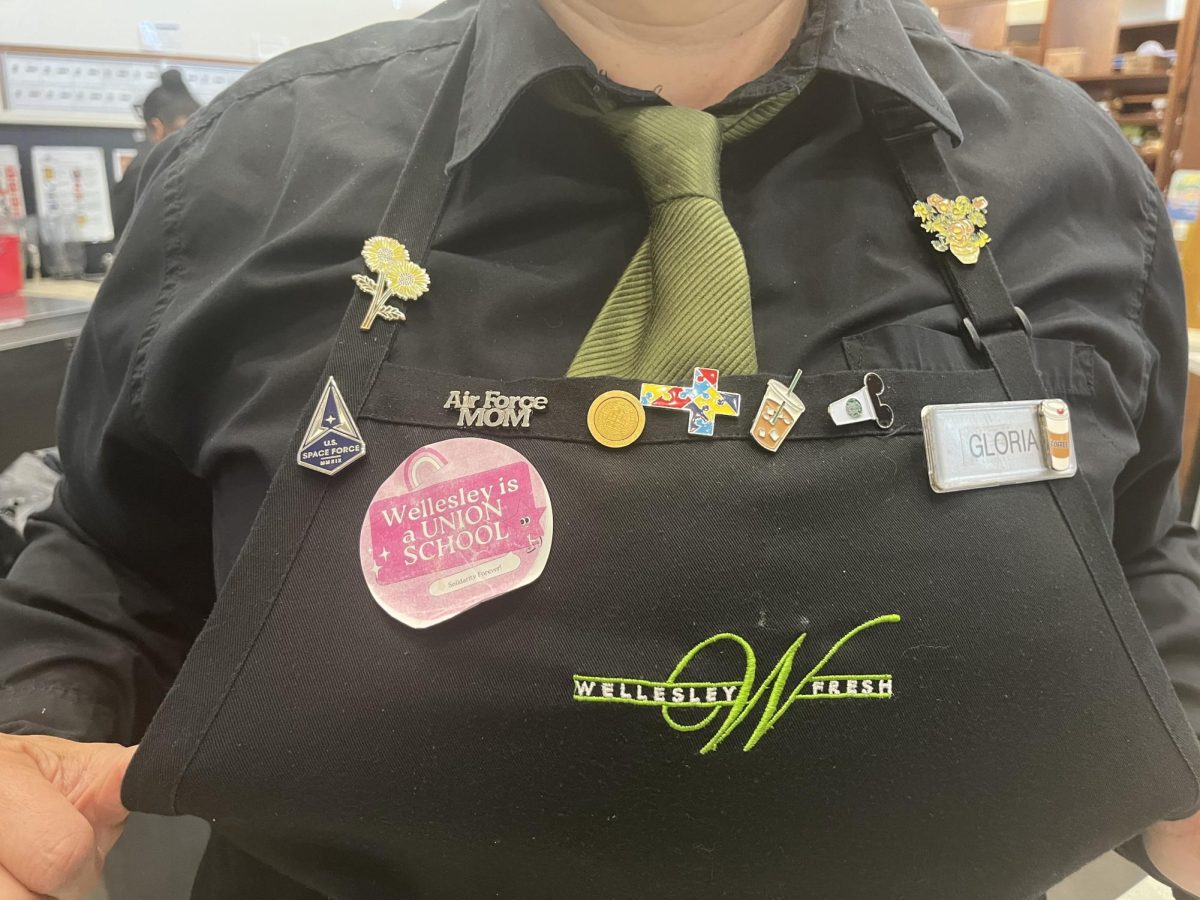The College blocked a unanimous vote passed on March 19 by the executive board of the Independent Maintenance and Service Employees’ Union of America (IMSEUA) to honor the Wellesley Organized Academic Workers (WOAW) picket line.
The College told the IMSEUA bargaining unit on March 21 that in the event of a strike, Wellesley College would remain operational, and IMSEUA employees would be expected to come to work.
The IMSEUA bargaining unit covers a wide variety of staff at Wellesley College, including food service, custodial staff, and groundskeepers. Workers at the power plant, distribution center, motor pool, golf course and botanic gardens are also unionized as part of the IMSEUA.
After receiving this notice, the IMSEUA filed a group grievance against Wellesley College on March 24, in an attempt to rescind the College’s interpretation of the no-strike clause in their contract.
The disagreement centers around Article 16 of the IMSEUA’s contract with Wellesley College, which states, “there shall be no strikes, lockouts, picketing, stoppage of work, slowdowns, boycotts or any other direct or indirect interference with operations of the College concerning any matter in dispute between the College and the Union or any of the employees.”
Wellesley College interprets this clause to mean that the IMSEUA is not allowed to participate in any work stoppages.
On the other hand, Tricia Diggins, a custodian and business agent for the IMSEUA, argues that a sympathy strike is allowed under their interpretation of the clause. For the purposes of the contract, an employee is a member of the IMSEUA bargaining unit. Thus, the “matter in dispute” is between the College and WOAW, not their union or employees, allowing IMSEUA members to strike.
According to their grievance procedures, the College’s director of labor and employee relations, Donna Scally, has 30 days to respond to an interdepartmental group grievance. If the IMSEUA disagrees, they can then ask for expedited arbitration, but the arbitration process can take months.
“Grievances and arbitration take forever,” said Diggins. “So God forbid the strike is still going on when we finally settle this.”
In the meantime, IMSEUA employees are allowed to show support for WOAW in other ways, such as wearing WOAW buttons, bringing picketers food or donating to the strike hardship fund.
Outside of their scheduled shifts, IMSEUA employees are also permitted to stand and hold signs near the picket line, but cannot officially picket.
The College is wary of overstepping guidelines governing what employers can say to their employees about organized labor, and Diggins emphasized that Scally was careful to maintain those boundaries. “Donna [Scally] told us she spoke to managers and told them not to express opinions to us,” she said.
Diggins explains that her father was a member of the large labor union, International Brotherhood of Teamsters (IBT), until the 1980s, when his company closed and he got a job as a custodian at Wellesley College.
“This is why my life’s been pretty good,” Diggins recalls, “because he had a union job.”
It has been difficult for Diggins and other employees who support WOAW to cross the picket line each day.
“It hurts us to do that,” said Gloria Figueroa, a barista at the Emporium and trustee on the IMSEUA executive board.
Still, sympathy strikes from other unionized companies have made it harder for certain IMSEUA employees to do their jobs.
The dining halls get the majority of their deliveries from Sysco, a multinational food distributor. At the beginning of the strike, there were concerns that food deliveries to the dining halls would be interrupted because more than 10,000 Sysco employees are part of the Teamsters union, including those at Sysco Boston.
The College has since developed a workaround with Sysco, where unionized truck drivers park outside the picket line and dining hall managers transport deliveries in smaller vans. Service at the dining halls has remained largely unaffected.
In a statement to the News, the College did not say whether they have made similar arrangements with other vendors, or whether these vendors are receiving additional compensation for accommodating the College.
Unlike the dining halls, many of the supplies for the Emporium come directly from Starbucks and are delivered by UPS, whose drivers are also unionized.
Figueroa says that the Emporium has only received one shipment of Starbucks supplies since the strike began, and they are already running out of ingredients needed to complete orders.
“That’s all I have left, one case of matcha,” said Figueroa. The Emporium was out of large cups for two weeks before a manager was able to complete their shipment, and is currently low on strawberry and dragon fruit inclusions.
Figueroa’s biggest concern is for the Wellesley community, especially in light of the Trump administration’s decision to revoke visas for students across the country and the potential impact of the strike on international students’ full-time status.
“I’m always reading what is happening with the student visas,” said Figueroa. “You guys know that we are here to support you on anything, and if there’s anything we can do, we will do it for the students.”
Another unexpected impact of the strike on IMSEUA employees? Elevators.
According to Diggins, at the IMSEUA executive board meeting on April 9, the group leader for preventive maintenance said that Stanley Elevator Company, responsible for elevator maintenance and repair, is unionized and would not be coming on campus during the strike.
Stanley Elevator Company did not immediately respond to a request for comment, and the College declined to comment on the College’s relationship with individual vendors.
Instead, Stacey Schmeidel, director of media relations, related a statement from Piper Orton, vice president for finance and administration and treasurer: “We will find solutions to problems to ensure that Wellesley can maintain critical functions, including feeding students and ensuring that buildings are in good working order.”
Contact the editors responsible for this story: Sazma Sarwar, Galeta Sandercock, and Valida Pau.




